would rather的用法
would rather用法
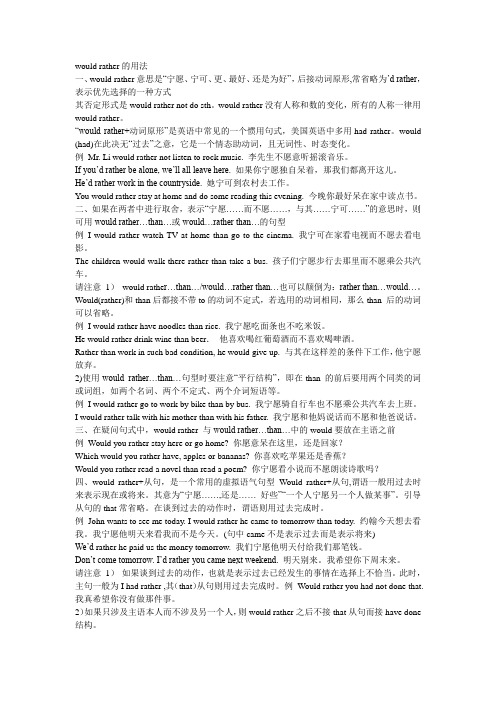
would rather的用法一、would rather意思是“宁愿、宁可、更、最好、还是为好”,后接动词原形,常省略为’d rather,表示优先选择的一种方式其否定形式是would rather not do sth。
would rather没有人称和数的变化,所有的人称一律用would rather。
“would rather+动词原形”是英语中常见的一个惯用句式,美国英语中多用had rather。
would (had)在此决无“过去”之意,它是一个情态助动词,且无词性、时态变化。
例Mr. Li would rather not listen to rock music. 李先生不愿意听摇滚音乐。
If you’d rather be alone, we’ll all leave here. 如果你宁愿独自呆着,那我们都离开这儿。
He’d rather work in the countryside. 她宁可到农村去工作。
You would rather stay at home and do some reading this evening. 今晚你最好呆在家中读点书。
二、如果在两者中进行取舍,表示“宁愿……而不愿……,与其……宁可……”的意思时,则可用would rather…than…或would…rather than…的句型例I would rather watch TV at home than go to the cinema. 我宁可在家看电视而不愿去看电影。
The children would walk there rather than take a bus. 孩子们宁愿步行去那里而不愿乘公共汽车。
请注意1)would rathe r…than…/would…rather than…也可以颠倒为:rather than…would…。
Would(rather)和than后都接不带to的动词不定式,若选用的动词相同,那么than 后的动词可以省略。
would rather的用法小结

would rather的用法(美国英语中多用had rather )一、概述。
1.含义。
“宁愿/可,更/最好,还是…为好”。
2.用法。
常+V原,常省略为’d rather,表优先选择的一种方式。
无人称,数,词性,时态变化,所有的人称情况均用would rather.3.否定形式。
would rather not do sth。
例: Mr Li would rather not listen to rock music4.would /had在此决无“过去”之意,它是一个情态助动词。
If yo u’d rather be alone, we’ll all leave here. 如果你宁愿独自呆着,那我们都离开这儿。
He’d rather work in the countryside. 她宁可到农村去工作。
二、扩展。
1.在两者中取舍,表“宁愿……而不愿……/与其……宁可……”时,则可用would rather…than…或would…rather than…句型. 例: I would rather watch TV at home than go to the cinema.The children would walk there rather than take a bus.2.也可以颠倒为:rather than…would…例:Rather than work in such bad condition, he would give up3.Would(rather)和than后都接不带to的动词不定式,若选同一动词,那么than 后的动词可以省略。
例: I would rather have noodles than rice.4.要注意“平行结构”,即在than 的前后要用两个同类的词或词组,如两个n、两个不定式、两个介短等。
例: I would rather go to work by bike than by bus.@I would rather talk with his mother than with his father.5.在疑问句式中,短语中的would要放在主语之前。
would-rather的详细用法
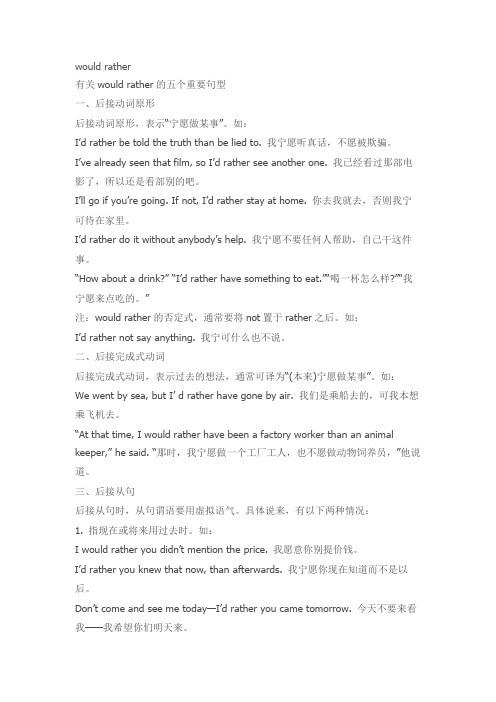
would rather有关would rather的五个重要句型一、后接动词原形后接动词原形,表示“宁愿做某事”。
如:I’d rather be told the truth than be lied to. 我宁愿听真话,不愿被欺骗。
I’ve already seen that film, so I’d rather see another one. 我已经看过那部电影了,所以还是看部别的吧。
I’ll go if you’re going. If not, I’d rather stay at home. 你去我就去,否则我宁可待在家里。
I’d rather do it without anybody’s help. 我宁愿不要任何人帮助,自己干这件事。
“How about a drink?” “I’d rather have something to eat.”“喝一杯怎么样?”“我宁愿来点吃的。
”注:would rather的否定式,通常要将not置于rather之后。
如:I’d rather not say anything. 我宁可什么也不说。
二、后接完成式动词后接完成式动词,表示过去的想法,通常可译为“(本来)宁愿做某事”。
如:We went by sea, but I’ d rather have gone by air. 我们是乘船去的,可我本想乘飞机去。
“At that time, I would rather have been a factory worker than an animal keeper,” he said. “那时,我宁愿做一个工厂工人,也不愿做动物饲养员,”他说道。
三、后接从句后接从句时,从句谓语要用虚拟语气。
具体说来,有以下两种情况:1.指现在或将来用过去时。
如:I would rather you didn’t mention the price. 我愿意你别提价钱。
高中英语---would rather用法总结
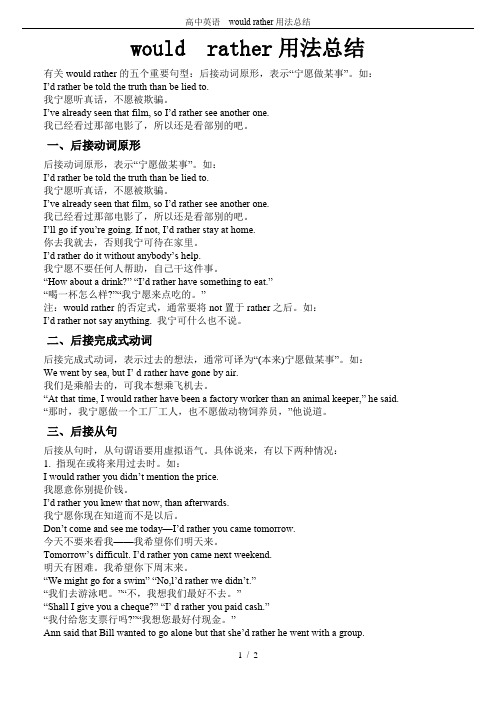
would rather用法总结有关would rather的五个重要句型:后接动词原形,表示“宁愿做某事”。
如:I’d rather be told the truth than be lied to.我宁愿听真话,不愿被欺骗。
I’ve already seen that film, so I’d rather see another one.我已经看过那部电影了,所以还是看部别的吧。
一、后接动词原形后接动词原形,表示“宁愿做某事”。
如:I’d rather be told the truth than be lied to.我宁愿听真话,不愿被欺骗。
I’ve already seen that film, so I’d rather see another one.我已经看过那部电影了,所以还是看部别的吧。
I’ll go if you’re going. If not, I’d rather stay at home.你去我就去,否则我宁可待在家里。
I’d rather do it without anybody’s help.我宁愿不要任何人帮助,自己干这件事。
“How about a drink?” “I’d rather have something to eat.”“喝一杯怎么样?”“我宁愿来点吃的。
”注:would rather的否定式,通常要将not置于rather之后。
如:I’d rather not say anything. 我宁可什么也不说。
二、后接完成式动词后接完成式动词,表示过去的想法,通常可译为“(本来)宁愿做某事”。
如:We went by sea, but I’ d rather have gone by air.我们是乘船去的,可我本想乘飞机去。
“At that time, I would rather have been a factory worker than an animal keeper,” he said. “那时,我宁愿做一个工厂工人,也不愿做动物饲养员,”他说道。
wouldrather的用法

would rather 的用法 (美国英语中多用had rather )一、概述。
1. 含义。
“宁愿 / 可,更 / 最好 ,还是?为好”。
2. 用法。
常 +V 原 , 常省略为’ drather ,表优先选择的一种方式。
无人称 , 数 ,词性 ,时态变化 ,所有的人称情况均用 would rather .3. 否定形式。
would rather not do sth 。
例 : Mr Li would rather not listen to rock music4.would /had 在此决无“过去”之意,它是一个情态助动词。
If yo u’ d rather be alone, we ’ ll all leave如here果你.宁愿独自呆着,那我们都离开这儿。
He’ d rather work in the countryside. 她宁可到农村去工作。
二、扩展。
1. 在两者中取舍 ,表“宁愿??而不愿??/与其??宁可??”时,则可用 would rather ? than ?或 would ? rather than 句型?.例: I would rather watch TV at home than go to the cinema.The children would walk there rather than take a bus.2.也可以颠倒为: rather than ? would ?例: Rather than work in such bad condition, he would giveup3.Would(rather) 和 than 后都接不带 to 的动词不定式,若选同一动词 ,那么 than 后的动词可以省略。
例: I would rather have noodles than rice.4.要注意“平行结构”,即在than的前后要用两个同类的词或词组,如两个n 、两个不定式、两个介短等。
would rather的虚拟语气用法

would rather的虚拟语气用法Would rather是一个非常常见的英语短语,意为“宁愿……”,是虚拟语气的一种用法。
在日常生活中,我们经常用would rather表达自己的喜好或选择,有时也会用它来表示期望或建议。
本文将会详细讲解would rather的用法,帮助大家更好地理解和使用这一短语。
1. would rather的基本结构Would rather的基本结构是would rather + 动词原型。
例如:- I would rather stay at home than go out. 我宁愿呆在家里也不出去。
- Would you rather have a glass of water or a cup of coffee? 你喜欢喝一杯水还是一杯咖啡?- He would rather play basketball than watch TV. 他宁愿打篮球也不看电视。
2. 表示现在或将来的虚拟Would rather可以用来表达对现在或将来的假设或期望。
这种用法通常是由if引导的条件句,其谓语动词要使用虚拟语气(即be动词用were,其他动词用动词原型)。
例如:- If I had more money, I would rather buy a car than take the bus. 如果我有更多的钱,我宁愿买辆车也不坐公交。
- If it doesn't rain tomorrow, we would rather have a picnic than stay indoors. 如果明天不下雨,我们宁愿野餐也不呆在室内。
3. 表示过去的虚拟在过去式的句子中,would rather常常用来表达说话人过去的偏好或选择,通常是用had rather的过去时态,had与rather之间用not连接。
例如:- I had rather not eat seafood when I was younger. 我小时候不太喜欢吃海鲜。
would rather
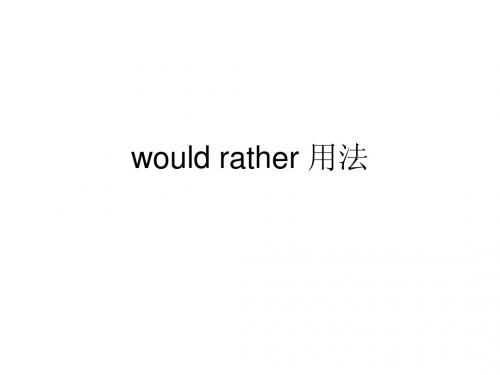
• 希望某人现在/ 将会做某事, 暗含事实上是不可能的 • 如: • I would rather you were here now . • 我希望你现在在这里就好了. • I would rather you saw me off at the airport tomorrow . • 我但愿你明天来机场送我. see off
• 2.would rather have done sth. 当时宁愿做 了...,暗含对过去作过事情后悔了 • 如:I would rather have taken his advice at the meeting • 我宁愿当时在会上听取他的建议就好了。 • (事实上我并没有那么听取,暗含我现在后悔 了)
would rather 用法
• 1.would rather do A than do B= prefer to do A rather than do B • 表示宁愿去做A,而不愿去做B • 如: • I would rather fail than cheat in the examination. • 我宁愿考不及格,也不愿意考试作弊。
• 4.would rather sb. had done sth. 宁愿某人 做过某事, 表示与过去事实相反 • 如:I would rather he had told me about it. • 我宁愿你过去跟我说的是实话. • 暗含而事实上你并没有跟我说实话.
•
worth 的 用法
• 1. worth: be worth + n. 当名词为金钱时, 表示"…… 值得……" • be worth doing sth. "……某事值得被做" • The question is not worth discussing again and again. • This second-hand car is worth $2000 at the most. • The exhibition is worth a visit/visiting.
would rather 用法归纳
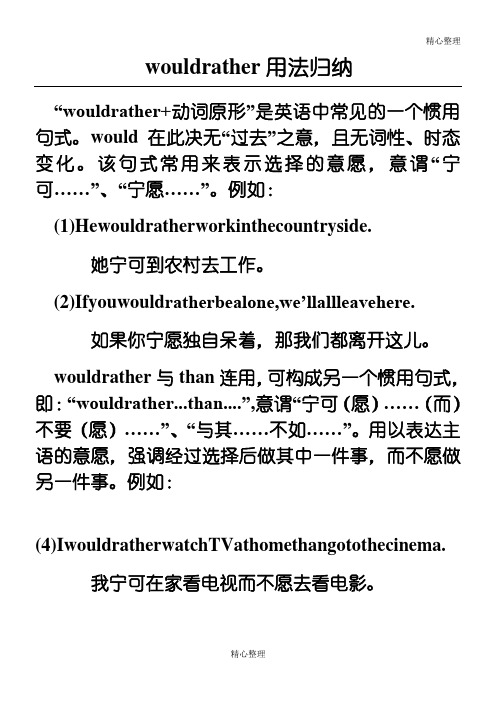
精心整理
wouldrather用法归纳
“wouldrather+动词原形”是英语中常见的一个惯用句式。
would在此决无“过去”之意,且无词性、时态变化。
该句式常用来表示选择的意愿,意谓“宁可……”、“宁愿……”。
例如:
(2)Ifyouwould
wouldrather与可构成另一个惯用句式,即:意谓“宁可(愿)……(而)
“与其……不如……”。
用以表达主
(4)IwouldratherwatchTVathomethangotothecinema.
我宁可在家看电视而不愿去看电影。
(5)Thechildrenwouldratherwalktherethantakeabus.
孩子们宁愿步行去那里而不乘公共汽车。
在使用“wouldrather...than...”句型时,应注意以下几点:
1.than)),
那个动词可省去。
如:
.
3.ratherthan置
yfrommyfriends.
试比较
Iwouldborrowmoneyfrommyfriendsratherthanrefu setohelpyou.
我宁可向朋友借钱,也不愿拒绝帮助你。
4.wouldrather后还可接动词的完成式,表示主语要做某事,而结果事与愿违的意思。
如:
(8)Iwouldratherhaveleftanoteonherdesk.
我本想留张字条在她书桌上的。
(事实上没有留)
试比较
(9。
- 1、下载文档前请自行甄别文档内容的完整性,平台不提供额外的编辑、内容补充、找答案等附加服务。
- 2、"仅部分预览"的文档,不可在线预览部分如存在完整性等问题,可反馈申请退款(可完整预览的文档不适用该条件!)。
- 3、如文档侵犯您的权益,请联系客服反馈,我们会尽快为您处理(人工客服工作时间:9:00-18:30)。
would rather用法总结一、“would rather+动词原形”是英语中常见的一个惯用句式(美国英语中多用had rather)。
’d rather为would(或had)rather的缩写形式。
would (had)在此决无“过去”之意,且无词性、时态的变化。
该句式常用来表示选择的意愿,意为“宁可……;宁愿……;最好……”。
例如:
He'd rather work in the countryside. 他宁可到农村去工作。
If you'd rather be alone, we'll all leave here. 如果你宁愿独自呆着,那我们都离开这儿。
You would rather stay at home and do some reading this evening. 今晚你最好呆在家里看点书。
二、would rather与than连用,可构成另一个惯用句式,即:“would rather...than....”意为“宁可(愿)……(而)不要(愿)……;与其……不如……”。
用以表达主语的意愿,强调经过选择后做其中一件事,而不愿做另一件事。
例如:
I would rather watch TV at home than go to the cinema. 我宁可在家看电视而不愿去看电影。
三、在使用“would rather...than...”句型时,应注意以下几点:
1. than 后边也应接动词原形,但如该句型前后连接的两个动词相同,则than之后的那个动词可省去。
例如:
I'd rather know that now than afterwards. 我宁可现在就知道这件事,而不是以后。
2. would rather...than...也可改写成“would...rather than...”,其用法及含义仍不变。
例如:Facing the enemies, our soldiers would die rather than surrender. 面对敌人,我们的战士宁死不屈。
3. 有时为了表示语气上的强调,可将rather than置于句首。
例如:
Rather than refuse to help you, I would borrow money from my friends. 我宁可向朋友借钱,也不愿拒绝帮助你。
4. would rather后也可跟从句,表示主语宁愿让某人干某事。
这时,从句谓语动词要用虚拟语气,即用一般过去时表示现在或将来要做的事;用过去完成时表示已经做过的事或过去要做的事。
例如:
I'd rather she set out to do the work now. 我宁愿她现在就着手做这项工作。
I'd rather you met her at the airport tomorrow morning. 我但愿你明天早上能在机场见到她。
I'd rather you hadn't told him the news that day. 我真希望你那天没有把那个消息告诉他。
5. would rather后还可接动词的完成式,表示主语要做某事,而结果却事与愿违。
例如:
I'd rather have left a note on her desk. 我本想留张字条在她书桌上的。
(事实上没有留)
试比较
I'd rather I left a note on her desk. 我宁可留张字条在她的书桌上。
四、巩固练习。
1. 选择最佳答案。
1)—Shall I open the window to let some fresh air in?
—No, _______ .
A. I'd rather not
B. I'd rather you not
C. I'd rather you didn't
D. I'd like not to
2) I would rather you _______ with us yesterday, but you left.
A. had stayed.
B. stay
C. stayed
D. have stayed
3) — _______ , I think well of him.
—But I would rather _______ to see him yesterday.
A. Personally;go
B. Personally;have gone
C. As far as I am concerned;/
D. As far as I am concerned;went
4)—Do you mind if I keep pets in this building?
—_______ .
A. I'd rather you didn't , actually
B. Of course not, it's not allowed here
C. Great! I love pets
D. No, you can't
5)—Would you _______ have tea or wine?
—_______ . I prefer coffee.
A. rather; Either
B. rather; Neither
C. like; Neither
D. rather; Both
6)—Did you quarrel with the boss?
—Yes, but _______ that.
A. I'd rather do
B. I'd like to do
C. I'd rather not have done that
D. I'd like to have done
2. 完成句子。
1) I would rather _______ (去).
2) I would rather _______ (不去).
3) I would rather ______________(你常去那).
4) I would rather ______________ (你明天去那).
5) I would rather ______________ (你昨天去了那).
6) I would rather ______________ (去那而不待在这).
7) I would rather ________________ (很受罪而不愿你去那).
答案与解析
1. 1)答案C。
本题考查情景交流用语。
I'd rather not是I'd rather not open the window.的省略句,意思是“我不愿开窗”。
I'd rather 后不跟you not 结构,B项语法不正确。
I'd rather 后可跟从句,从句中的谓语动词用一般过去时态,所以选项C为正确答案。
2)答案A。
解此题的关键是would rather后接从句,从句用虚拟语气,用过去完成时表示过去要做的事,又根据信息词yesterday 进一步说明选项A是正确的。
3)答案B。
根据信息词yesterday。
4)答案A。
意为“实际上,我但愿你不要(养宠物)”,正好符合语境。
5)答案B。
考查would rather do something句式和neither的用法。
两者都表否定。
6)答案C。
意为:“我但愿过去没有和他争吵”。
符合语境。
在做题中,尤其要注意对would rather have done something的理解,它和其他情态动词的完成体用法类似, 表示“宁愿(过去)做了某事”,实际上没做。
2. 1) go 2) not go 3) you often went there 4) you went there tomorrow 5) you had gone there yesterday 6) go there than stay here 7) suffer a lot than you would go there。
